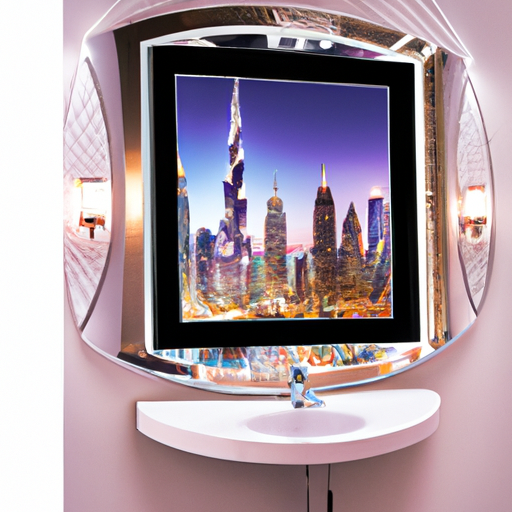- October 6, 2023
- Posted by: DBS
- Category: Business

If you have ever dreamed of starting your own beauty salon in Dubai, look no further. This article will provide you with all the necessary information you need to know in order to successfully launch your very own salon in this thriving city. From the initial steps of business setup and company formation to the intricacies of freezone company formation and registering your business in Abu Dhabi, we will guide you every step of the way. Additionally, we will touch on pro services, corporate banking, and specific tips on how to start a beauty salon in Dubai. So, let’s dive right in and explore the exciting world of beauty salon entrepreneurship in the vibrant city of Dubai.
Research and Planning
Starting a beauty salon in Dubai requires careful research and planning to ensure success. Before diving into the process, it is crucial to determine your target market. Consider the demographics, preferences, and needs of the customers you aim to serve. This will help you tailor your salon to their requirements and stand out in the competitive market.
Conducting comprehensive market research is the next step. This involves analyzing the demand for beauty salons in Dubai, identifying your potential competitors, and understanding their offerings. By gaining insights into the market, you can identify gaps and opportunities to differentiate your salon from others.
Analyzing the competition is essential to develop a strong business strategy. Study the services, pricing, customer reviews, and marketing strategies of your competitors. This will enable you to position your salon in a unique way and offer services that meet the demands of the target market.
Creating a well-structured business plan is imperative for the success of your beauty salon. This document outlines your business goals, marketing strategies, financial projections, and operational procedures. A comprehensive business plan will serve as a roadmap and help you make informed decisions throughout the establishment and operation of your salon.
Legal Requirements and Documentation
Understanding the legal framework is crucial when starting a beauty salon in Dubai. Familiarize yourself with the laws and regulations governing the beauty industry, including licensing requirements, hygiene standards, and labor laws. This knowledge ensures compliance and avoids potential legal issues in the future.
Choose a legal business entity that aligns with your aspirations and business model. Options include sole proprietorship, partnership, limited liability company (LLC), or a free zone entity. Each has its pros and cons, so consult with legal professionals to determine the most suitable structure for your salon.
Obtaining necessary licenses and permits is a crucial step in establishing your beauty salon. The specific licenses required may vary depending on the services you offer, such as hair, nails, spa treatments, or cosmetic procedures. Consult with relevant authorities, such as the Department of Economic Development (DED) or Dubai Health Authority (DHA), to ensure you fulfill all legal requirements.
Registering your salon with the relevant authorities is essential for operating legally in Dubai. This typically involves registering with the DED or the relevant free zone authority. The registration process may include providing documentation such as lease agreements, a business plan, and your legal entity documents. Adhering to these legal requirements and obtaining the necessary documentation will set a strong foundation for your salon’s operations.
Location and Facilities
Choosing a suitable location for your beauty salon is crucial for attracting customers and ensuring convenience. Consider factors such as accessibility, visibility, and the presence of your target market. Locations near residential areas, commercial centers, or popular tourist destinations can be ideal choices.
When selecting a location, also consider the size and layout of the salon. Ensure that it is spacious enough to accommodate all the necessary facilities and equipment. A well-designed layout will provide a comfortable environment for your customers and efficient workflow for your staff.
Ensure the availability of necessary facilities such as plumbing, electricity, ventilation, and adequate storage space. Collaboration with professionals, such as architects and interior designers, can help optimize the utilization of space and ensure a functional and aesthetically pleasing salon.
Adhering to zoning and building regulations is crucial when selecting a location for your salon. Check with the local authorities to ensure your chosen location is zoned for commercial use and complies with all building codes. This will avoid legal issues and potential disruptions to your salon’s operations.
Funding and Financial Considerations
Assessing the initial investment required is an essential step in the planning process. Consider expenses such as lease or purchase costs, interior design, salon equipment, licenses, and initial marketing expenses. Conduct thorough research and seek advice from financial professionals to determine a realistic budget for starting your beauty salon.
Exploring financing options can help fund your beauty salon’s startup costs. Options include self-funding, bank loans, investors, or partnerships. Research various sources of funding, evaluate their terms and conditions, and determine the most suitable option for your salon’s financial needs.
Developing a detailed budget is crucial to manage your salon’s finances effectively. Consider both fixed and variable costs, such as rent, utilities, employee salaries, inventory, marketing, and maintenance expenses. A comprehensive budget will help you track your expenses, make informed decisions, and keep your salon financially stable.
Establishing a financial management system is vital for the long-term success of your salon. Implement accounting software or hire a professional bookkeeper to track your salon’s income and expenses, manage payroll, and maintain accurate financial records. Regularly review your financial performance and make adjustments as necessary to ensure profitability.
Staffing and HR
Defining the roles and responsibilities within your beauty salon is essential for efficient operations. Determine the positions you need, such as hairstylists, estheticians, nail technicians, receptionists, and managers. Clearly define the responsibilities and qualifications required for each role to ensure a smooth workflow.
Recruiting skilled and licensed professionals is crucial for providing high-quality services to your customers. Consider their qualifications, experience, and expertise in the specific services your salon offers. Conduct thorough interviews, check references, and assess their skills through practical assessments if necessary.
Developing an employee training program ensures consistency in service quality and adherence to your salon’s standards. Train your staff on customer service skills, hygiene practices, product knowledge, and the specific techniques required for their respective roles. Ongoing training and professional development opportunities will keep your staff motivated and up-to-date with the latest trends and techniques.
Ensure compliance with labor laws in Dubai when hiring and managing your salon’s staff. Familiarize yourself with regulations regarding working hours, leave policies, employee contracts, and termination procedures. Complying with labor laws will protect both your employees’ rights and your salon from legal issues.
Equipment and Supplies
Identifying the necessary salon equipment is crucial for providing a wide range of services to your customers. Consider the specific services your salon will offer and invest in high-quality equipment that meets industry standards. This may include hairstyling chairs, wash basins, nail stations, spa beds, and professional-grade skincare equipment.
Source reliable suppliers for your salon equipment and supplies. Research reputable suppliers and compare prices, warranties, and customer reviews. Building strong relationships with reliable suppliers can ensure timely delivery and ongoing support for your salon’s equipment needs.
When choosing equipment, consider both quality and durability. Investing in high-quality equipment may require a higher initial investment, but it will save you money in the long run by reducing maintenance and replacement costs. Opt for durable equipment from reputable brands to ensure long-term usability.
Maintaining an inventory management system is essential for efficient salon operations. Track your inventory of products, tools, and supplies to avoid stock shortages or wastage. Utilize software or manual tracking methods to keep accurate records of your inventory levels, sales trends, and reorder points.
Services and Pricing
Determining the range of services to offer is a critical decision for your beauty salon. Consider the demands and preferences of your target market when selecting services such as hairstyling, hair coloring, nail care, skincare, body treatments, and makeup services. Offering a comprehensive range of services will attract a diverse customer base.
Set competitive pricing for your services based on market research and analysis of your competitors. Consider factors such as the quality of service, experience of your staff, and the costs involved in delivering each service. Aim to provide value for money while ensuring profitability for your salon.
Consider offering package deals and promotions to attract new customers and encourage loyalty. Bundling multiple services or offering discounted rates for multiple visits can entice customers to try various services and keep coming back. Develop creative promotional strategies to differentiate your salon and attract customers in a competitive market.
Periodically review and update your service offerings to stay relevant in the rapidly evolving beauty industry. Stay informed about the latest trends, techniques, and customer demands. Regularly assess the profitability and popularity of your services and make adjustments as necessary to meet customer expectations.
Marketing and Advertising
Developing a strong brand identity is essential for establishing your beauty salon’s reputation and attracting customers. Craft a compelling brand story, logo, and visual identity that communicates your salon’s values, unique selling points, and target market. Consistently apply your brand identity across all marketing materials and platforms.
Create an effective marketing strategy to promote your beauty salon to your target audience. Identify the most appropriate marketing channels, such as social media, online advertising, print media, or collaborations with local businesses. Allocate a reasonable budget and track the effectiveness of each marketing campaign to optimize your marketing efforts.
Utilize digital marketing channels to reach a wider audience and interact with potential customers. Develop a professional website that showcases your salon’s services, team, and contact information. Leverage social media platforms to engage with your audience, share updates, offer promotions, and showcase your work through high-quality images and videos.
Collaborate with influencers and local businesses to expand your salon’s reach and attract new customers. Partner with influencers who align with your salon’s brand and target market to amplify your message and gain credibility. Partnering with local businesses for cross-promotions can also help increase visibility and attract customers from complementary industries.
Customer Experience and Retention
Creating a welcoming and comfortable ambiance is crucial for providing a positive customer experience. Pay attention to interior design, lighting, music, and overall atmosphere to create a relaxing environment. Utilize comfortable furniture, soothing colors, and pleasant aromas to enhance the customer experience.
Implement excellent customer service practices to ensure customer satisfaction. Train your staff to be friendly, helpful, and attentive to customers’ needs. Respond promptly to customer inquiries and feedback, whether in-person, over the phone, or online. Personalize the customer experience by providing consultations and recommendations tailored to each customer’s preferences and goals.
Offer personalized consultations and recommendations to enhance the customer experience. Train your staff to assess each customer’s needs and provide expert advice on suitable services and products. This personalized approach will build trust, encourage repeat visits, and generate positive word-of-mouth referrals.
Implement loyalty and referral programs to incentivize customer retention and encourage advocacy. Offer rewards, discounts, or exclusive perks to loyal customers who frequently visit or refer others to your salon. Implement a system to track and reward customer loyalty to strengthen relationships and increase customer lifetime value.
Conclusion
Starting a beauty salon in Dubai requires thorough research, meticulous planning, and adherence to legal requirements. By determining your target market, conducting market research, analyzing competition, and creating a business plan, you can lay the foundation for success. Understanding the legal framework, choosing a suitable location, and acquiring necessary licenses and permits are essential steps in the establishment process. Consider funding options, develop a detailed budget, and establish a financial management system to ensure financial stability. Staff your salon with skilled professionals, invest in high-quality equipment, and offer a comprehensive range of services at competitive prices. Develop a strong brand identity, implement an effective marketing strategy, and prioritize excellent customer service to attract and retain customers. By following these steps, you can set yourself up for success in the beauty salon industry in Dubai.

